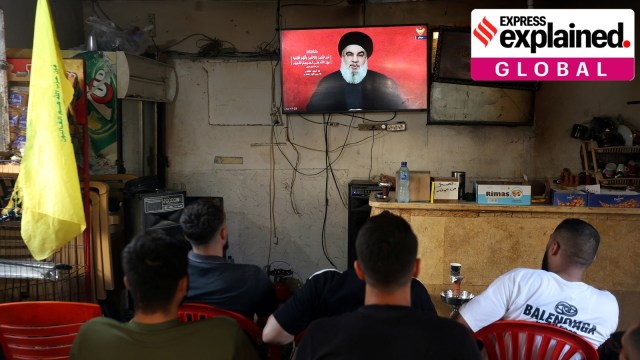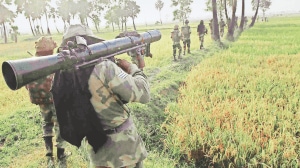Shubhajit Roy, Diplomatic Editor at The Indian Express, has been a journalist for more than 25 years now. Roy joined The Indian Express in October 2003 and has been reporting on foreign affairs for more than 17 years now. Based in Delhi, he has also led the National government and political bureau at The Indian Express in Delhi — a team of reporters who cover the national government and politics for the newspaper. He has got the Ramnath Goenka Journalism award for Excellence in Journalism ‘2016. He got this award for his coverage of the Holey Bakery attack in Dhaka and its aftermath. He also got the IIMCAA Award for the Journalist of the Year, 2022, (Jury’s special mention) for his coverage of the fall of Kabul in August 2021 — he was one of the few Indian journalists in Kabul and the only mainstream newspaper to have covered the Taliban’s capture of power in mid-August, 2021. ... Read More
With new phase of the Israel-Hezbollah conflict, what are the concerns for India?
The deadly attacks on Hezbollah leaders and cadre in Lebanon mark a new phase of Israel’s war against its regional adversaries. West Asia could be on the brink of a wider conflict that could draw in Iran and the US.
 Hezbollah leader Hassan Nasrallah speaks on TV. (Reuters)
Hezbollah leader Hassan Nasrallah speaks on TV. (Reuters)Tensions in West Asia have spiked afresh after pagers and hand-held radios exploded in two days of coordinated attacks across Lebanon and parts of Syria, killing at least 37 persons and injuring more than 3,500, according to the Lebanese government.
Hezbollah, the Iranian-backed Lebanese political party and militant group, has accused Israel of carrying out the attacks, which the Israelis have neither owned nor disowned.
In a speech delivered on Thursday evening (September 19), Hezbollah leader Hassan Nasrallah said the attacks were “a terrorist act” and declaration of war against Lebanon and its people. Amid widespread anticipation of retaliation from Hezbollah and Iran, what does this latest escalation mean for the region, the world, and India?
Context of Gaza war
After the Palestinian militant group Hamas attacked southern Israel on October 7 last year, killing around 1,200 Israelis and taking 250 hostage, Israel launched its massive retaliation, in which more than 41,000 Palestinians have been killed in Gaza so far. After 11 months of airstrikes and ground operations, about 100 hostages remain in Hamas captivity.
Throughout this period, Hezbollah has engaged Israel through shelling and rocket fire along its northern border, leading to the displacement of 63,439 Israelis from their homes close to the border, according to official Israeli government figures.
An estimated 95,000 Lebanese too, have been displaced by Israeli rocket and missile strikes in the south of Lebanon.
 Hezbollah members carry the coffins of two of their comrades who were killed on Wednesday when a handheld device exploded. (AP Photo)
Hezbollah members carry the coffins of two of their comrades who were killed on Wednesday when a handheld device exploded. (AP Photo)
Signals of escalation
Hours before thousands of pagers — one-way communication devices used widely by Hezbollah — started to explode on Tuesday, Israel’s security cabinet updated its official war goals to add the safe return of displaced Israelis to the two existing objectives of destroying Hamas and bringing back the hostages.
A statement from Prime Minister Benjamin Netanyahu’s office strongly suggested the possibility of expanding military operations to get Hezbollah to stop firing at Israeli targets.
A day earlier, Israel’s Defence Minister Yoav Gallant had told US special envoy Amos Hochstein that “the only way left to ensure the return of Israel’s northern communities to their homes will be via military action”.
And on Wednesday, after the explosions of walkie-talkies and other communication devices, Gallant announced to Israeli Air Force personnel that “the centre of gravity is moving north. We are diverting forces, resources, and energy toward the north.”
Twenty-six Israeli civilians and 20 soldiers have been killed in Hezbollah attacks near the northern border since the beginning of the war in Gaza. Israeli fire is reported to have killed more than 450 Hezbollah members and more than 100 civilians in Lebanon over the past 11 months.
“I believe that we are at the onset of a new phase in this war, and we need to adapt,” Gallant said at the Ramat David air base in northern Israel. “We will need consistency over time; this war requires great courage, determination, and perseverance.”
Pivot to the north
Israel’s military believes that it has been able to “substantially” degrade the capabilities of Hamas in Gaza — having destroyed their missile and rocket factories, bombed the tunnels where they stored weapons and ammunition, killed about 15,000 Hamas fighters, and taken out its political head Ismail Haniyeh and military commander Mohammad Deif.
While Yahya Sinwar, the leader of Hamas in Gaza, continues to be active, Israel now feels confident that the group no longer has the capacity to hit back at it. Therefore, it believes, the time has come to shift focus more substantially towards Hezbollah, the much more powerful adversary in the north.
An early indication of this intent came on July 30, when an Israeli airstrike in Beirut killed Fuad Shukr, a top Hezbollah commander who Israel said was behind a rocket attack that had killed 12 children and teens in Israeli-controlled Golan Heights three days previously.
This week’s targeting of communication devices used by Hezbollah is aimed at crippling the group’s command and control structure.
According to a former Israeli intelligence official, the 3,000-odd individuals targeted in the two days of attacks constitute the top rung of Hezbollah’s 100,000-strong membership — essentially the equivalent of ranks from colonel to general — who communicate through secret means.
The attacks are also meant to deliver a message to the leadership in Tehran, the main benefactor of not just Hezbollah, but also Hamas and the Houthis of Yemen — that enemies of Israel are not safe even in their own homes.
Fallout of the attacks
Hezbollah is widely expected to strike back at a time of its choosing. On Thursday, Nasrallah vowed a “just punishment” for the attacks, and to make sure that evacuated Israelis are not able to return to their homes. Will Israel follow up on the attacks of this week with ground operations against Lebanon?
“There is a serious risk of a dramatic escalation in Lebanon, and everything must be done to avoid that escalation,” UN Secretary-General Antonio Guterres said on Wednesday. Several scenarios are possible over the next few weeks.
Iran is seen as a pragmatic rival, which will be determined to avenge the humiliation, but will not rush to do so in a rage.
There could be a repeat of the April attack when Iran launched a wave of aerial strikes on targets in Israel, though with limited impact. Tehran could coordinate with its partners in the so-called Axis of Resistance — Hamas, Hezbollah and the Houthis — to carry out attacks on Israel. Or it could target Israeli officials in third countries, perhaps after waiting for some time.
Israel, on its part, could carry out an aerial offensive against not just Hezbollah but also the Lebanese state apparatus.
It could lead a limited ground incursion into Lebanon, targeting Hezbollah in villages and tunnels, destroying weapons and missile stockpiles, and try to create some sort of a buffer zone in southern Lebanon. On Thursday, as Nasrallah spoke, Israeli supersonic fighter jets flew over Beirut.
The view from India
All these scenarios present serious concerns for India.
India has so far managed to walk the diplomatic tightrope between Israel and the Palestinians. But any escalation between Israel and Hezbollah will mean Iran will be part of the conflict, which could draw in the United States as well — this could present New Delhi with a far more complex diplomatic challenge.
Some 9 million Indians live and work in the region. These people are often the sole breadwinners of their families, and the largest source of remittances to India. New Delhi would be worried for their safety and security.
About two-third of India’s crude oil and natural gas comes from the West Asian region, and an impact on crude prices and supply could impact the country’s energy security.
In 2012, an Israeli diplomat’s wife was targeted in a bomb attack in New Delhi. India would not want a repeat of that incident.
India has so far made no statements on the volatile situation in the region. In April, after the Iranian attack on Israel, India had expressed “serious concern” at the escalation of hostilities, and called for “immediate de-escalation”.
External Affairs Minister S Jaishankar had discussed the situation with both Iran’s Foreign Minister Hossein Amir-Abdollahian and Israel’s Foreign Minister Israel Katz at the time. While this showed the trust both sides placed in India, what leverage, if any, New Delhi has in the possible new situation of war remains to be seen.



- 01
- 02
- 03
- 04
- 05




































